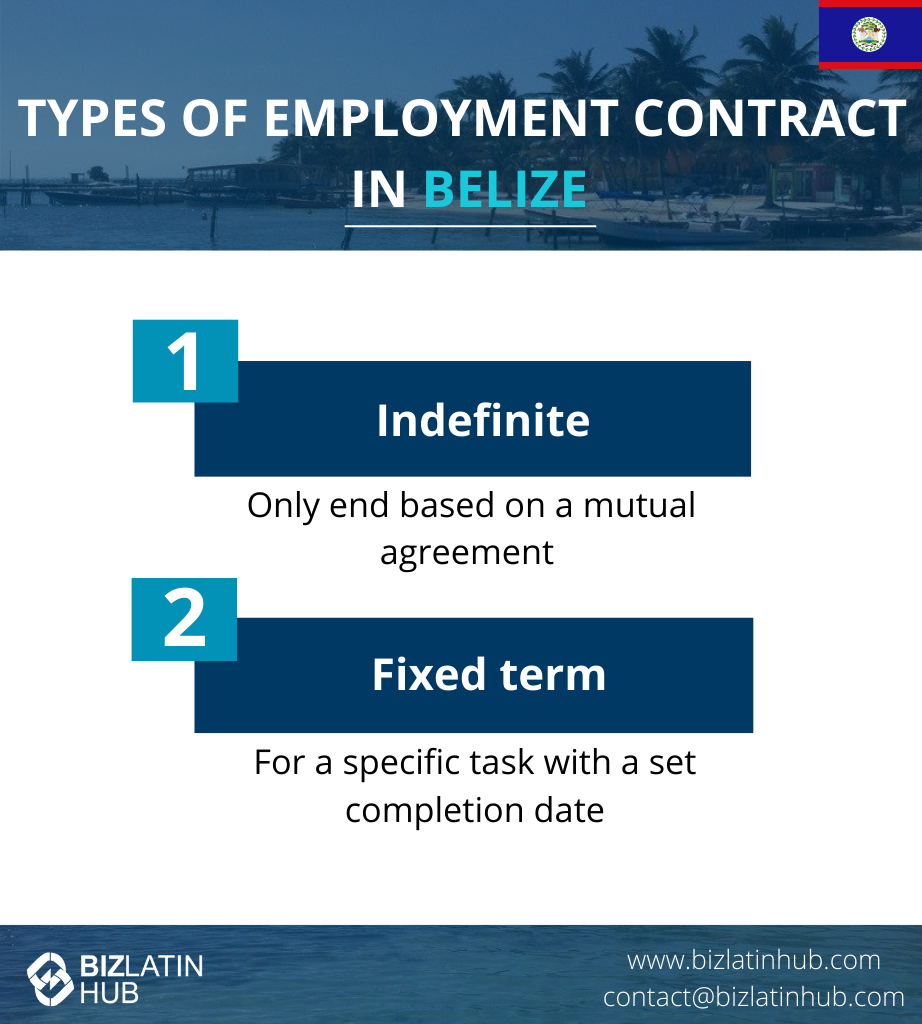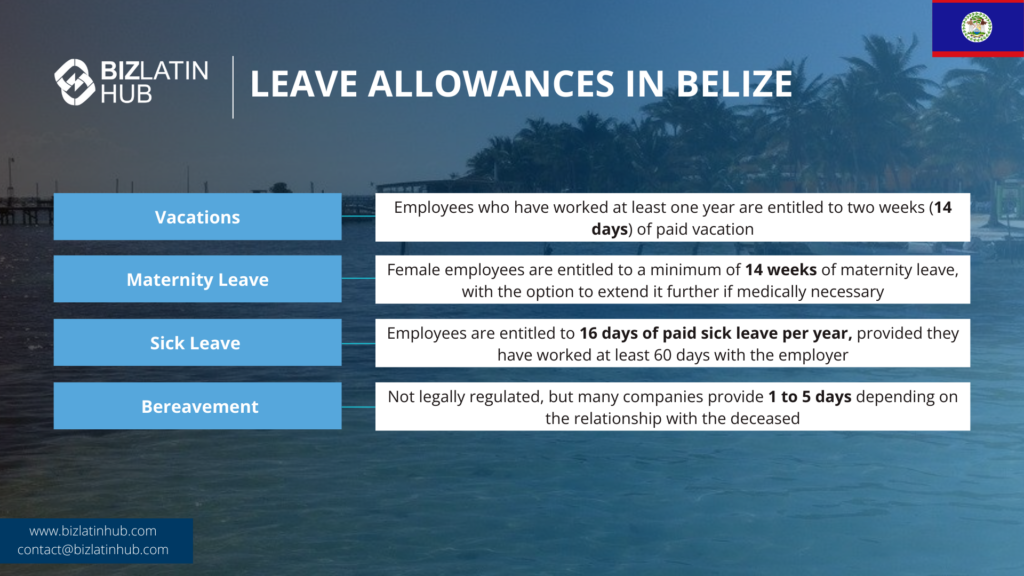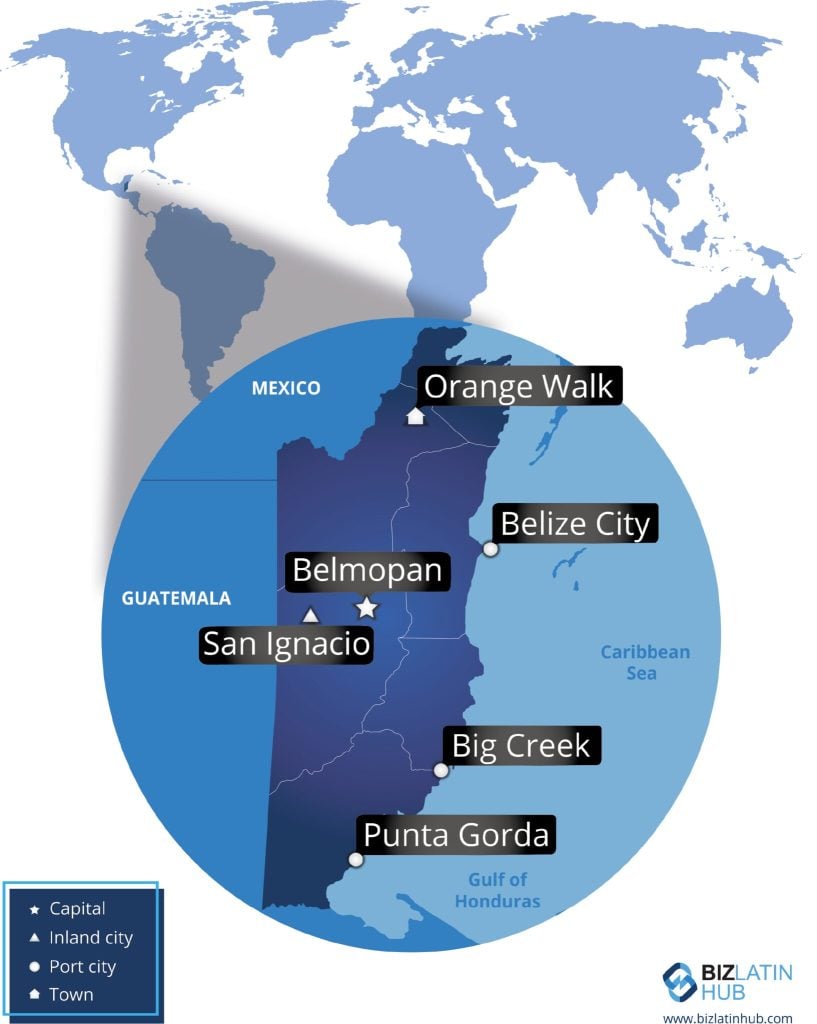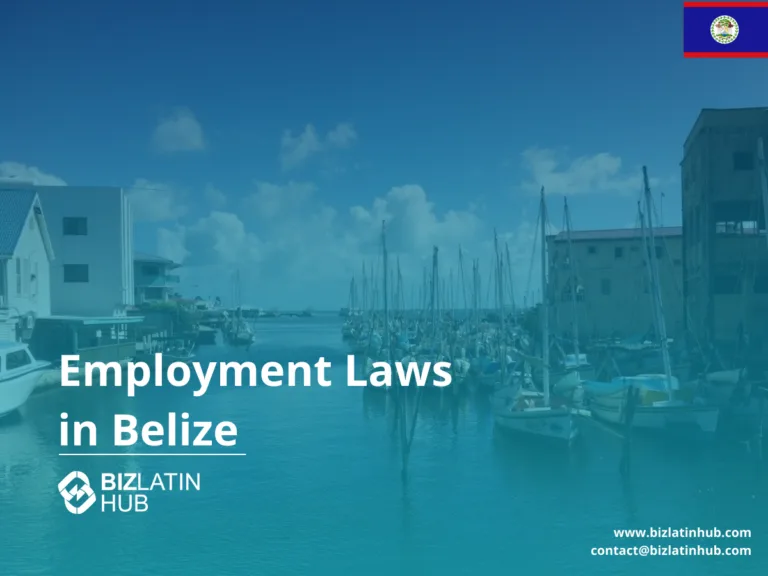This small but vibrant country in Central America boasts a rich cultural heritage and a burgeoning economy for those who want to incorporate a company in Belize. Key to its economic well-being are the Belize labor laws that govern employers’ and employees’ rights and responsibilities. You need to know, for example, what the new minimum wage will be and when it comes into effect. This guide details the essential requirements for employers, covering contracts, statutory benefits, and termination procedures as mandated by the law.
Key Takeaways: Belize Labour Laws
| What are the main provisions of the Belize Labour Act? | |
| What is the Belizean minimum wage? | The minimum wage in Belize is BZD$5.00 per hour from January 1, 2025. |
| Types of Employment Contracts in Belize | Contracts come in two types: indefinite or fixed term. The latter must be clearly defined, for a specific reason and cannot generally be renewed. |
| What percentage of an employee’s salary contributed to social security in Belize? | Employers must make monthly contributions to the Social Security Board (SSB). Social Security contributions for employers are equivalent to 8% of the employee’s gross salary, up to a maximum of BZD$720 per month. |
| What is the difference between notice pay and severance pay? | |
| Are oral contracts legal? | A written statement of employment particulars is a legal requirement. |
| What are the standard working hours and overtime rules? | 45 hours weekly, split between five or six days. Any work over this must be paid at a premium rate, usually time and half. |
Key Employer Obligations Under the Labour Act
The foundation of Belize’s labor laws can be traced back to its colonial past, with influences from British common law and subsequent legislative developments post-independence. Over the years, these laws have changed to address the growing needs of the labor force and to align with international standards and conventions.
One of the landmark legislations in Belize’s labor history is the Labour Act of 2000, which consolidated and modernized various labor laws into a comprehensive framework. This Act and the later amendments form the backbone of Belize’s labor regulatory regime, encompassing broad employment-related matters.
1. Provide a Written Statement of Particulars
Within 14 days of starting, an employee must receive a written statement detailing the key terms of their employment, including pay, hours, and job title.
2. Adhere to Wage, Hours, and Leave Rules
Employers must pay at least the minimum wage. They must also provide employees with their statutory entitlements for annual vacation leave, sick leave, and public holidays.
3. Make Social Security Board (SSB) Contributions
It is mandatory for employers to register with the SSB and make regular social security contributions for every employee.
4. Follow Termination and Severance Pay Regulations
An employer must provide a statutory notice period before termination. In cases of redundancy, an employee is also legally entitled to a separate severance payment based on their length of service.
Expert Tip: Understanding the Dual Entitlement to Notice and Severance Pay
From our experience, a common and costly mistake for foreign employers in Belize is misunderstanding termination payments. Under the Labour Act, when an employee is terminated for redundancy, they are typically entitled to both payment in lieu of notice and severance pay.
Many employers assume severance pay covers the notice period, which is incorrect. This can effectively double the expected cost of a termination. We strongly advise clients to budget for both payments when calculating termination liabilities for any employee with over a year of service.
What are the core provisions of the Belize labor laws?
While the range of the labor laws is extensive, here are five essential provisions on which the rest are based.
Employment Contracts
Belize labor laws mandate that employers provide written contracts to most employees detailing terms and conditions of employment. These terms include wages, working hours, benefits, and termination procedures. Such a mandate ensures transparency and clarity in the employment relationship and helps prevent disputes. Oral contracts are possible, but not recommended as they have less flexiblity when drafted.
Additionally, the law prohibits discrimination based on race, sex, religion, nationality, or disability, emphasizing equal opportunities for all employees. Contracts come in two types: indefinite or fixed term. The latter must be clearly defined, for a specific reason and cannot generally be renewed.
Working Hours and Overtime
When it comes to working hours under Belizean labor laws, the standard workweek consists of 45 hours. These are typically spread over five or six days. Any work performed beyond the standard hours is considered overtime and must be compensated at a premium rate, usually one and a half times the regular wage.
Attorney Idaliz H. Guiraud Ortiz says that “exceptions to the standard workweek exist for certain industries or occupations, such as agriculture, tourism, and healthcare, where longer hours may be necessary due to seasonal demands or operational requirements.”
Minimum Wage
Belize has established a minimum wage to ensure all workers receive fair compensation for their labor. The minimum wage in Belize will be BZD$5.00 per hour from January 1, 2025. This is the latest revised amount for all categories of workers as part of the government’s strategy to alleviate poverty and reduce income inequality. Employers are required to pay at least the minimum wage to their employees, and failure to do so constitutes a violation of labor laws, subject to penalties and sanctions.
Occupational Health and Safety
Belize labor laws further prioritize the health and safety of workers, requiring employers to maintain a safe and healthy work environment free from hazards. Employers must implement appropriate measures to prevent accidents, injuries, and occupational illnesses, such as providing protective equipment and training.
As Central American attorney Idaliz Guiraud explains, “Employees have the right to refuse unsafe work conditions without fear of retaliation, and they are entitled to report any workplace hazards to relevant authorities for investigation and enforcement.”
Maternity and Paternity Rights
Belize labor laws also protect pregnant women and new parents. This happens through the provision of maternity leave, breastfeeding breaks, and paternity leave. Female employees are entitled to a minimum of 14 weeks of maternity leave, with the option to extend it further if medically necessary. Paternity leave is not mandatory under law in Belize. These provisions aim to promote work-life balance and gender equality in the workforce.
Termination
Employees in Belize can be dismissed for just cause such as breaking the terms of their contract or acting in an unlawful manner, similar to most countries. In this case they will receive no severance pay. In cases where an employee is dismissed for reasons that do not constitute just cause, compensation must be paid to them.
Severance pay and notice both depend on length of service with the company. An employee that has been with the company for less than six months can be given as little as one week of notice, extending to a fortnight for employees who have served up to five years. After that, eight weeks notice must be given. Compensation is generally calculated at one week’s pay per year of service up to five years and two week’s pay per year thereafter.

Impact and Enforcement
Enforcement and compliance with the labor requirements are not without challenges despite the solid framework they provide for protecting worker’s rights. Such challenges include limited resources, inadequate oversight mechanisms, and gaps in awareness among employees and employers. These challenges contribute to instances of labor law violations and exploitation affecting fair employment practices.
To address these issues, concerted efforts are needed from government agencies, labor unions, employers, and civil society organizations. All stakeholders should seek to strengthen enforcement mechanisms, raise awareness about labor rights, and foster a culture of compliance.
Further effort should go towards enhancing access to justice through legal aid services, alternative dispute resolution mechanisms, and effective remedies for labor law violations. These conditions are essential to safeguarding workers’ rights and promoting social justice.
The Role of the Labour Department
The Labour Department, under the Ministry of Rural Transformation, Community Development, Labour and Local Government, is the government body responsible for the administration and enforcement of the Labour Act. It investigates workplace disputes, ensures compliance with employment standards, and promotes fair labour practices.

Frequently Asked Questions: Belize Labour Law
Based on our extensive experience, these are the common questions and doubts of our clients on Belize labor laws:
1. What are the core provisions of the Belize Labor Laws?
- Employment Contracts
- Working Hours and Overtime
- Minimum Wage
- Occupational Health and Safety
- Maternity and Paternity Rights
2. How many hours does the standard workweek consist of in Belize?
Under Belizean labor laws, the standard workweek consists of 45 hours. These are typically spread over five or six days. Any work performed beyond the standard hours is considered overtime and must be compensated at a premium rate, usually one and a half times the regular wage.
3. What is the minimum wage in Belize?
The minimum wage in Belize is BZD$5.00 per hour as of January 1, 2025. This is the latest revised amount for all categories of workers as part of the government’s strategy to alleviate poverty and reduce income inequality. Employers are required to pay at least the minimum wage to their employees, and failure to do so constitutes a violation of labor laws, subject to penalties and sanctions.
4. How many weeks of maternity/paternity leave are people entitled to in Belize?
According to Belize’s labor laws, female employees are entitled to a minimum of 14 weeks of maternity leave, with the option to extend it further if medically necessary. Paternity leave is not mandatory under law in Belize. These provisions aim to promote work-life balance and gender equality in the workforce.
5. What do the labor laws state about employment contracts in Belize?
Belize’s labor laws state that employers must provide written contracts to employees detailing terms and conditions of employment. These terms include wages, working hours, benefits, and termination procedures. Such a mandate ensures transparency and clarity in the employment relationship and helps prevent disputes.
6. What do the labor laws state about occupational health and safety in Belize?
Belize’s labor laws state that employers must maintain a safe and healthy work environment free from hazards. Employers should do this by implementing appropriate measures to prevent accidents, injuries, and occupational illnesses, such as providing protective equipment and training.
7. What is the Social Security Board (SSB)?
The SSB is Belize’s social security system. All employers and employees are required to make weekly or monthly contributions. These contributions fund a range of benefits, including sickness, maternity, injury, and retirement pensions.
8. How is severance pay calculated?
For an employee with between one and ten years of service, severance pay is calculated as one week’s wages for each year of service. The rate increases for employees with longer service. Severance is payable upon redundancy or other qualifying terminations.

What is the future for Belize labor laws?
Belize has made significant strides in protecting workers’ rights and promoting fair labor practices. Its upgraded labor laws play a crucial role in shaping the country’s employment and ensuring the well-being of its workforce. The comprehensive framework covering employment contracts, working hours, minimum wage, occupational health and safety, and maternity rights protects workers’ rights.
However, challenges persist in enforcement and compliance and call for collaborative efforts from stakeholders to address systemic issues and strengthen labor protections. Belize can continue to advance its labor rights agenda and build a more inclusive and prosperous society following the principles of fairness, equality, and dignity in the workplace.
Biz Latin Hub can help you with Belize labor laws
At Biz Latin Hub, we offer a comprehensive range of market entry and back-office solutions in Belize, Latin America, and the Caribbean.
Our expertise encompasses legal services in Belize, hiring and PEO, accounting and taxation, company incorporation, and visa processing.
We have offices in big cities throughout the region and strong partnerships in many other markets. This gives us a vast network of resources that are perfectly suited to help with cross-border operations and entering new markets in different countries.
Contact us today to learn more about our services and how we can help you achieve your business goals in Latin America and the Caribbean.






